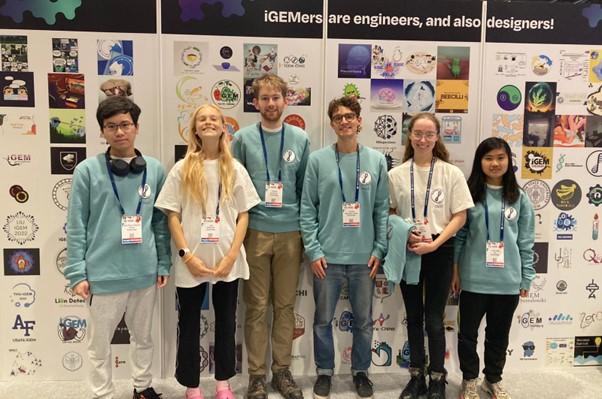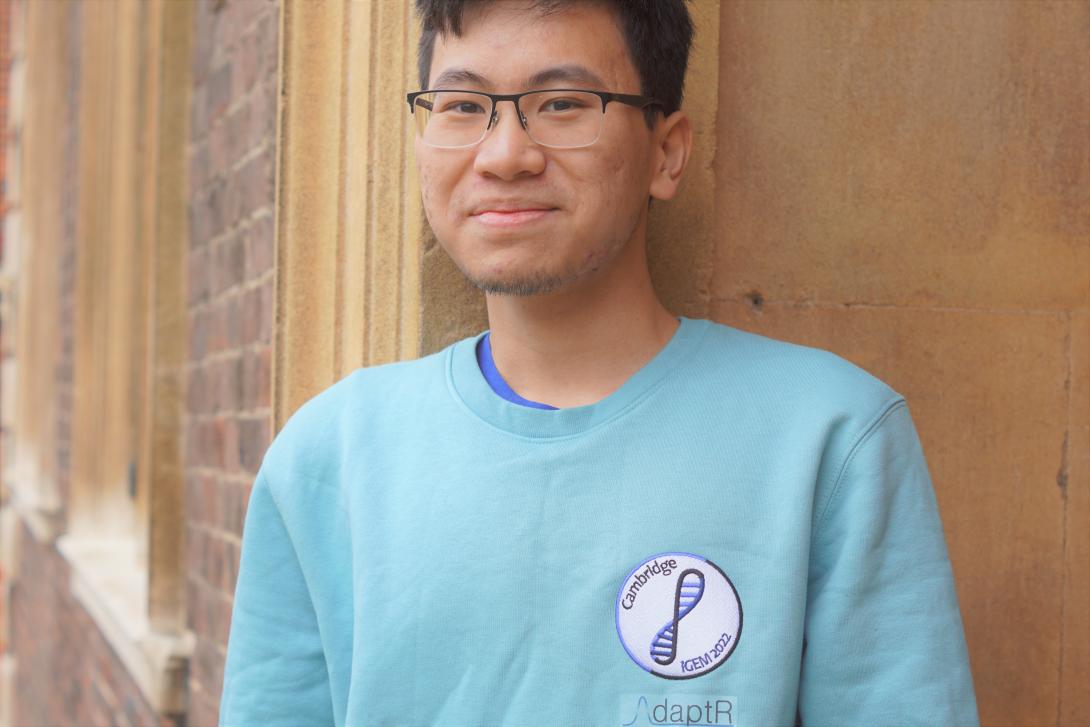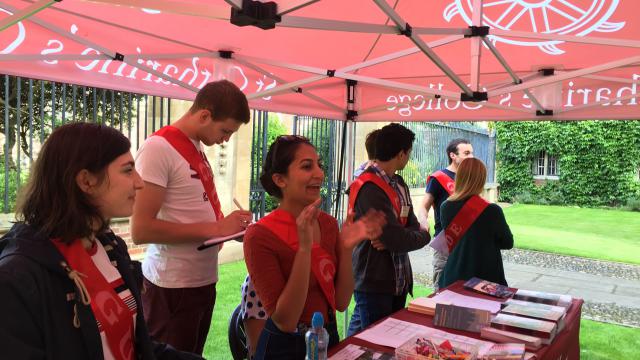
A St Catharine’s undergraduate student is part of a multidisciplinary team from the University of Cambridge that has just won the top prize in an international science competition. Anthony Phung, a second-year Natural Sciences undergraduate, and a team of five other students from the Cambridge University Synthetic Biology Society (CUSBS) claimed a gold medal in this year’s International Genetically Engineered Machine Competition, known as iGEM.
iGEM involves 350 student-run teams from over 40 countries competing to create novel biological systems to address real-life challenges – from food security and technology, to the environment and drug development – by combining molecular biology techniques with engineering principles. The 2022 competition saw teams travel to Paris in October for a Grand Jamboree event, where they presented their work through posters and oral sessions, and competed for prizes and awards.
The Cambridge team’s iGEM project was christened AdaptR and used cybergenetic approaches to design a new system that could have direct applications in metabolic engineering, biomanufacturing and microbial drug delivery. Their planning and research was largely delivered during the summer vacation and produced significant results.
Anthony explained, “While synthetic biology offers many promising applications, current advancements face severe challenges in bringing the science out of the lab and into the real world. This is because biologically engineered systems suffer high fragility and lack of robustness, and any deviation from ideal lab conditions undermines performance.
“The AdaptR team tackled this problem by developing a foundational genetic feedback circuit called an integral controller, inspired from classical engineering. To achieve this, we carefully selected different genetic components and rewired them into a complex synthetic circuit in E.coli bacteria. This platform allowed stable and consistent production of a protein or molecule of interest, regardless of external fluctuations or perturbations. We modularised the design so that it can be used for different proteins, a different range of perturbations or different reference levels of production.”
Cambridge had not competed in iGEM for the previous six years but students from the CUSBS decided the time was right for the University to return. As a result of this recent hiatus, the last student from St Catharine’s to participate was Dr Souradip Mookerjee (2013, Medical Sciences; former MCR Co-President) back in 2015.
Anthony added, “iGEM has given me a fantastic opportunity to independently ideate, plan and implement a whole project from start to finish. I have gained invaluable experiences: from operating complex instruments and computational literacy, to science communication and entrepreneurship. Cambridge will be running the competition again after this year’s success, and I hope more people will be inspired to take on the challenge!
“My journey has been supported by many members of the Catz family, with special thanks for always being there to Dr Sergei Taraskin (2002) and Professor David Aldridge (1997), who were my trusted maths supervisor and Director of Studies in my first year. I am also grateful for my tutor, Professor Harald Wydra (2003), for his pastoral support. Finally, I want to thank all my friends and colleagues in Catz for keeping me going through tough times.”
In addition to his team award, a side project that Anthony led during his first year was nominated for the iGEM Top 5 Best New Part Award for developing a new, useful genetic component that will have a lasting impact on the synthetic biology community. His part is dedicated to a genetic component called the araBAD Promoter (or pBAD for short) is a regulatory region of the native araBAD operon in E. coli, responsible for arabinose metabolism. Though it is widely exploited in genetic circuitry and fundamental research, the pBAD is quite long and only has sub-optimal strength.
“I set out to reengineer the improved version (called pBAD_AP) which is not only half the original length but also witnesses a four-fold increase in maximal activity. The Part is carefully documented and now available on the open source iGEM Registry, and I hope it will be useful for future teams and research applications.”
To find out more about the AdaptR project, visit https://2022.igem.wiki/cambridge/index.html
To see the presentation delivered in Paris at the Grand Jamboree, visit https://docs.google.com/presentation/d/1F6Lf4a3W4mvjCPz70hpn3OLI6wtXj8D51XN5zVKoPa8/edit#slide=id.g17174ecf133_1_0






